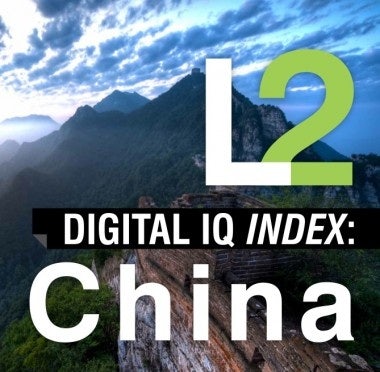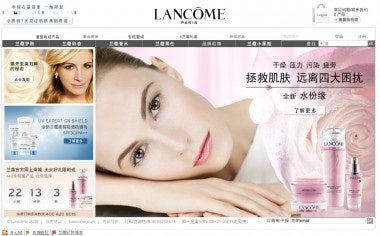L2 Think Tank Study By Scott Galloway (NYU) And Doug Guthrie (NYU, George Washington University) Measures Brands' "Digital IQ"#

In recent years, as Chinese luxury consumers have gotten younger and more sophisticated, and the marketplace has become more crowded, digital outreach in China has become critical for major global luxury brands. However, despite concerted efforts by a handful of brands, according to a new "Digital IQ" study by the L2 Think Tank -- a New York-based "think tank for prestige brands" -- most major luxury brands in China are failing miserably in their efforts (or non-efforts) to connect digitally with Chinese consumers.
According to Scott Galloway (NYU professor and founder of L2) and Doug Guthrie (NYU, George Washington University), who headed the study, "success in the world's fastest growing market is inextricably linked to digital competence." Noting that the number of Internet users in China is expected to jump from 384 million in 2009 to 2013, the Chinese luxury market is projected to grow 15% in 2010, and 80% of Chinese luxury consumers are younger than 45 years of age (compared to 30% in the U.S. and 19% in Japan), Galloway and Guthrie unequivocally state that a weak online presence -- in terms of site design and functionality, social media efforts, and digital marketing -- is a recipe for disaster for brands in China.
Some highlights of the study:
Ranking#
-
Lancome scored highest on the list of 100 "global prestige brands" in terms of Digital IQ#
, on the strength of the company's search-optimized site that "delivers on sales and local relevance." Also commended for managing a four-million-strong community of subscribers.
- Other companies that made the overall top 10 included
BMW#
(strong social media presence + owners' club),
Estee Lauder#
(local products),
Audi#
(strong social media),
Clinique#
("impressive site platform"),
Mercedes-Benz#
(social media),
Clarins#
(brand blog),
Acura#
,
Cadillac#
and
Wuliangye#
. (the only Chinese brand to break into the top 10 and, incidentally, the only non-cosmetic, non-automotive brand in the group.)
-
Brands that ranked lowest#
in the Digital IQ ranking included
Moet & Chandon#
(poor online presence, yet has significant traffic),
Chopard#
(virtually invisible on Baidu, no Chinese-language site),
Shanghai White#
(little social media presence),
Dom Perignon#
("brand has virtually ignored digial media in China), and
Franck Muller#
. (no Chinese site, lowest social media mentions of all brands in study.)
Key Findings#
- Though the size of China's e-commerce market quadrupled from 2006-2009, only 10 out of the 100 brands in the study offer online shopping. On average, brands that do offer online shopping score 50 points higher than those that do not.
The Beauty & Skincare category is a leader in e-commerce, with six of 13 brands selling online#
.
- Brands in the Fashion category and the Champagne & Spirits category have the lowest digital adoption in terms of Chinese-language and e-commerce functionality.
- Very few brands are using popular Chinese social media sites (RenRen, Qzone, Kaixin001, YouKu) to interact directly with consumers, though
Mercedes-Benz, Audi, Dior, and Lancome are actively and effectively engaging with users on a number of SNS platforms#
.
- Lancome's group page on Kaixin001 has over 250,000 members, and the brand regularly hosts contests and other interactive initiatives on its page.
- Four of the brands in the study have invested in branded "2.0 Communities," including Lancome's "Rose Beauty" community, BMW's "MyBMWClub.cn" site, Estee Lauder's "EL-Lady" community, and BBS sites from Audi, Mercedes-Benz and Porsche.
-
Only 42% of brands in the study have mobile-enabled sites#
, though there are an estimated 745 million mobile phone subscribers in the whole of China and more than 25% of those users access the Internet through their phones.
-
Hong Kong fashion house#
Shanghai Tang#
is one of the first luxury brands to incorporate a Chinese-language iPhone application#
-- "City Chic," launched in April 2010 -- which gives users "a taste of Shanghai."
- Brands of Mainland Chinese or Hong Kong origin score an average of 11 points higher than their global counterparts, and several local brands are early digital movers.
Baijiu maker Moutai and Hong Kong jeweler Luk Fook are the only brands in their categories to transact online, and Chinese skincare brand Herborist and Shanghai Tang are e-commerce enabled#
.
- While skincare brands Lancome, Clarins and Estee Lauder displayed Digital IQs far higher in China than in the U.S., champagne makers Veuve Clicquot, Moet & Chandon and Dom Perignon scored far lower in China.
None of these champagne brands support a Chinese-language of their brand site#
.
-
Retail footprint does not always equate to digital buzz#
. Even brands like Yvs Saint Laurent and Chanel that have a limited retail presence in China generate substantial fan discussion on popular social networking sites.
10 Commandments#

In addition to these -- and many other -- findings, the report lists Doug Guthrie's "10 Commandments for Commerce in China," an absolute must-read for anyone with an interest in the subject, just as Guthrie's China and Globalization is essential reading for anyone interested in the social and international implications of China's economic development. Excerpts of Guthrie's "10 Commandments":
1.)
Politics
: The new generation of government technocrats in China generally plays by the rules.
2.)
Institutions
: Institutions matter more than culture. The impenetrable part of doing business in China is the opacity of the instutitions.
3.)
Lawyers, Not Relationship Managers
: Companies are best suited hiring lawyers and accountants who understand the complexity of the Chinese business environment rather than "relationship managers."
4.)
Localism
: Local development means local opportunity.
5.)
Entrepreneurial Local Governments Are An Opportunity
: Get out of Shanghai and Beijing and into second-tier cities, where officials are more flexible and eager for foreign direct investment.
6.)
Local Competition
: Homegrown competition is a threat and an opportunity.
7.)
Understand Digital, Chinese-Style
: China has a frenzied digital scene, but it is very local.
8.)
Process Innovation
: China's strength lies in process innovation, which companies like Pepsi and IBM have absorbed from their China operations.
9.)
Leadership
: Invest in human capital.
10.)
Locate Near Universities
: There are several pockets of higher education in China that serve as breeding grounds for eager talent.
A copy of the L2 Digital IQ Index: China is available for download on the L2 website. Anyone interested in, involved in, or thinking of investing in the Chinese luxury market would be well served to give it a thorough read.